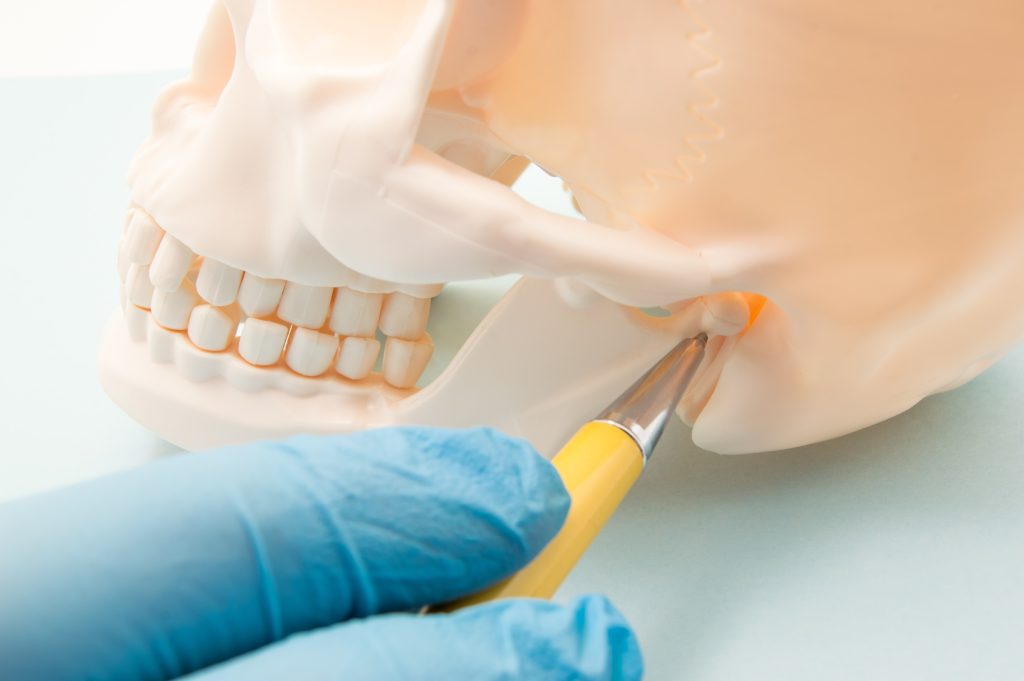What is TMJ and what is it caused by?

When it comes to oral health issues, the first thing most people think about are problems with the teeth or gums. Yet, the health of your jaw is also important. Issues affecting this part of the mouth and facial structure can impact you in a number of ways. Developing TMJ is one such issue, which can worsen over time and often require treatment. Knowing the symptoms for this condition and what can cause it will be beneficial in helping you maintain good oral health over the long term.
What is TMJ?
Temporomandibular joint disorder (TMJ) is a condition affecting the hinge or joint that connects your jawbone to the skull on both sides of the face. It can also affect facial nerves and the jaw muscles as well.
Within the joints of the jaw, tiny disks serve as a type of shock absorber and separate the cartilage located in the area. When these disks become misaligned or experience erosion over time, TMJ disorder can occur. Without diagnosis and treatment, this disorder will continue to progress, leading to additional problems.
What are the Symptoms of TMJ?
Symptoms you may be experiencing that indicate TMJ disorder can include:
- Jaw clicking or popping: A common sign of TMJ is the clicking or popping in the jaw area as you yawn, eat, or speak. The more often this occurs, and the stronger the sensation or sound becomes, the higher the likelihood that the joints in your jaw are damaged to some degree.
- Swelling: In some instances, you may notice swelling, either mild or severe, on a side of the face, and this can indicate inflammation building up within the joint of the jaw.
- Jaw locking in place: Upon opening your mouth, your jaw may temporarily lock in place, then eventually release with a clicking sound.
- Difficulty chewing: Jaw misalignment and TMJ can lead to difficulty in chewing your food. If you have severe misalignment, the muscles of your mouth will begin to try to compensate when you chew.
- Pain or tenderness in the jaw area: With dental misalignment and TMJ, the jaw muscles try to compensate, and as a result, you may experience pain or tenderness in this area.
- Other symptoms, including ringing in the ears or dizziness.
To make a definitive diagnosis, your dentist will need to start with an oral exam, which includes looking for your range of motion as you open your mouth and feeling the areas surrounding the jaw to see if you experience tenderness, pain, or other discomfort.
Next, you may need X-rays, a CT scan, or an MRI for your dentist to gain a more in-depth look at what is going on inside the jaw’s bones, muscles and tissues. If a diagnosis is still not definitive, your dentist may conduct a TMJ arthroscopy in which a tiny tube containing a camera is inserted into the jaw joint area.
What Causes TMJ?
While TMJ is not easily diagnosed in most instances, there are particular causes behind the condition, including teeth misalignment, injury, bruxism, genetics, and certain types of arthritis.
Teeth Misalignment
The most common cause of TMJ is teeth misalignment. Your dentist will look for any misalignment in your bite and also ask you direct questions relating to symptoms of TMJ. Solutions abound for correcting the misalignment of teeth and, in turn, treating any developing problems in the jaw.
Jaw Injury
Trauma to the jaw area can cause an injury to the Temporomandibular joint or the surrounding muscles and tissues. TMJ symptoms can soon follow, alerting you to see your dentist as soon as possible. If you seek medical attention for such an injury, the attending physician may also refer you to a dental professional for further examination.
Bruxism
Bruxism is the continual grinding and clenching of teeth at night as you sleep. This act is usually an unconscious activity, and you may be unaware that you are doing it. The longer it occurs, however, the higher your risk of developing a TMJ disorder. To help, your dentist can provide you with night guards to wear to prevent the grinding and clenching.
Genetics
Many oral health issues are attributable to your genetics. Bone structure and more can be affected by these genetics and sometimes lead to TMJ conditions.
Arthritis (osteoarthritis, rheumatoid arthritis, etc.)
Patients can suffer arthritis in the jaw, and this can cause the occurrence of TMJ disorders. Common symptoms of this include inflammation, pain, and restricted jaw movement.
If you experience one or more of the symptoms listed above, be sure to schedule a dental appointment as soon as possible to determine if you have a TMJ disorder and, if so, to find out what treatments are available.
Contact Park Street Dental to Learn More About TMJ
If you currently suffer with any of the symptoms of TMJ disorder or would like to learn more information about it and what treatments are available, contact the dedicated team here at Park Street Dental. We will provide you with the information you need and also the services to help you maintain your smile and dental health going forward.
